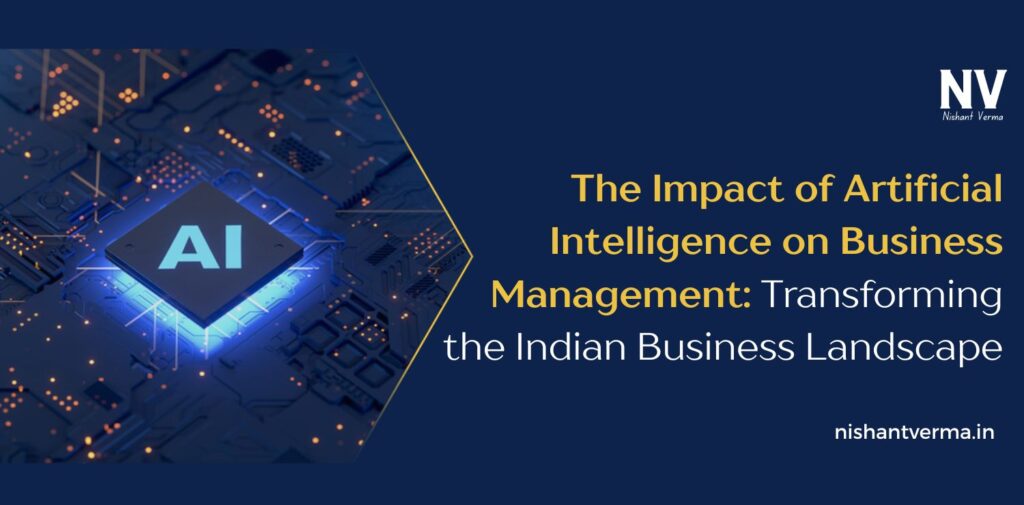In recent years, Artificial Intelligence (AI) has become one of the most transformative technologies in business. For businesses around the world, and especially in India, AI is no longer a futuristic concept but a present-day reality that is reshaping how companies operate. From automating routine tasks to improving decision-making and enhancing customer experience, AI is impacting various aspects of business management. In this article, we will explore how AI is transforming business management in India, highlighting its benefits, challenges, and future potential.

What is Artificial Intelligence and How Does It Work?
Before diving into its impact on business management, it’s important to understand what AI is. Artificial Intelligence refers to the ability of machines to perform tasks that normally require human intelligence. These tasks include learning from experience (machine learning), recognizing patterns, making decisions, and understanding natural language. In simple terms, AI enables computers and systems to think and act like humans, but at a much faster pace.
AI works by processing vast amounts of data, analyzing patterns, and making predictions or decisions based on that information. In business, AI tools can automate tasks, predict customer behavior, optimize operations, and much more. In India, AI is being adopted in sectors such as retail, finance, healthcare, and manufacturing to improve efficiency and gain a competitive edge.
Improving Efficiency Through Automation
One of the biggest impacts of AI in business management is the automation of repetitive and time-consuming tasks. In India, where businesses face challenges like resource constraints, automation through AI can significantly improve operational efficiency. For example, AI-powered software can handle tasks such as data entry, scheduling, inventory management, and even customer support, freeing up employees to focus on more strategic tasks.
Take the case of a small or medium-sized business in India that is struggling with managing customer inquiries. Instead of hiring a large customer service team, AI-powered chatbots can handle common questions, process orders, and resolve issues 24/7. This not only reduces operational costs but also ensures that customers receive prompt responses, improving their overall experience.
Similarly, AI can be used to automate supply chain management by predicting demand patterns and optimizing inventory levels, ensuring that businesses have the right products at the right time without overstocking or understocking. This is particularly useful for businesses in India that face logistical challenges due to infrastructure and supply chain complexities.
Enhancing Decision-Making with Data-Driven Insights
AI is also transforming decision-making by providing businesses with data-driven insights. In a country like India, where businesses operate in a highly diverse and competitive environment, making informed decisions is key to success. AI tools can process vast amounts of data from various sources, including customer interactions, market trends, and social media, to provide valuable insights that help business leaders make better decisions.
For example, AI can help businesses analyze customer behavior to predict which products are likely to be in demand, allowing them to adjust their marketing strategies accordingly. In India, where consumer preferences can vary greatly from region to region, AI can segment customers based on demographics, buying patterns, and preferences, providing businesses with personalized recommendations to target specific customer groups effectively.
Moreover, AI-powered analytics tools can help businesses identify areas for cost reduction and efficiency improvements. In sectors like manufacturing and retail, AI can analyze production data to detect inefficiencies or predict machine failures, reducing downtime and improving overall productivity.

Improving Customer Experience with Personalization
AI is revolutionizing customer service by enabling businesses to offer personalized experiences. In India, where customers have increasingly high expectations and are exposed to global standards of service, personalization is becoming a key factor in building strong customer relationships. AI can analyze customer data to provide tailored recommendations, offers, and services that resonate with individual preferences.
For example, e-commerce platforms like Flipkart and Amazon use AI to recommend products based on past purchases, search history, and browsing behavior. This personalized approach not only increases customer satisfaction but also drives sales by suggesting relevant products. Similarly, in the hospitality industry, AI can be used to personalize guest experiences, from customized room preferences to personalized dining options.
AI can also improve customer service through intelligent chatbots that can provide real-time assistance. For businesses in India that have large customer bases and receive high volumes of inquiries, AI-powered chatbots can answer questions, resolve issues, and even guide customers through complex processes, all without human intervention. This improves efficiency while maintaining high customer satisfaction levels.
Cost Reduction and Resource Optimization
Another significant impact of AI in business management is its ability to reduce costs and optimize resource allocation. In a country like India, where businesses often operate on tight budgets, AI can help businesses maximize their resources and cut unnecessary costs. For example, AI can optimize energy consumption in manufacturing plants, reduce waste in production processes, and streamline administrative tasks.
In industries like agriculture, AI is helping businesses optimize crop yields by analyzing soil health, weather patterns, and crop growth. Indian farmers are increasingly using AI-driven platforms to monitor their farms, detect diseases early, and predict harvest times, leading to higher productivity and reduced costs.
AI also enables businesses to make smarter investments by predicting market trends and demand patterns. This helps companies allocate their resources more effectively and avoid overinvestment in areas that may not yield high returns. For example, AI tools can analyze past sales data and predict which products or services are likely to perform well in the future, allowing businesses to focus their efforts on high-potential areas.
Challenges and Risks of AI in Business Management
While the benefits of AI in business management are clear, there are also some challenges and risks associated with its adoption. One of the main concerns in India is the lack of skilled professionals who can effectively implement and manage AI technologies. AI requires a certain level of expertise in data science, machine learning, and software development, which can be a barrier for many businesses, especially small and medium-sized enterprises (SMEs).
Another challenge is the high initial investment required to implement AI systems. While AI can save money in the long run, the upfront costs of purchasing AI software, training employees, and integrating AI into existing systems can be significant. This can be a major hurdle for small businesses in India that may not have the financial resources to invest in AI technologies.
Moreover, there are concerns about data privacy and security. With AI systems processing large amounts of personal and business data, there is a risk of data breaches and misuse. Indian businesses need to ensure that they comply with data protection regulations and take necessary precautions to secure their systems.

The Future of AI in Indian Business Management
Despite the challenges, the future of AI in business management in India looks promising. With the Indian government’s focus on digitalization and the increasing availability of AI tools at affordable prices, businesses of all sizes are expected to embrace AI in the coming years. In sectors like retail, healthcare, education, and manufacturing, AI will continue to play a crucial role in improving efficiency, reducing costs, and enhancing customer experiences.
Moreover, as AI technologies become more accessible and user-friendly, even small businesses in rural areas of India will have the opportunity to benefit from AI-driven solutions. As AI adoption increases, we can expect to see greater innovation, improved productivity, and more competitive businesses across India.
Conclusion: AI – A Game-Changer for Indian Business Management
Artificial Intelligence is already changing the way businesses in India operate and manage their resources. From automating tasks and improving decision-making to personalizing customer experiences and reducing costs, AI offers businesses a powerful tool to enhance efficiency and stay competitive in a rapidly evolving market. However, businesses need to address challenges such as the lack of skilled professionals, high implementation costs, and data security concerns to fully capitalize on AI’s potential.
As AI technology continues to evolve and become more accessible, it is clear that it will remain a game-changer in business management. By adopting AI, Indian businesses can unlock new opportunities for growth, innovation, and success in the global marketplace. The key for businesses is to start small, embrace change, and adapt to the AI revolution, which will undoubtedly shape the future of business in India.




